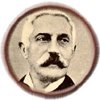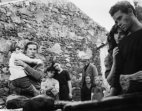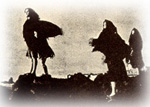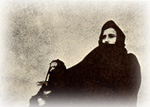|
||||||||||
Verga, "I Malavoglia" and "La Terra Trema" |
||||||||||
|
HIS LIFE 1840-1865 On the 2nd September of 1840 in a wealthy economic condition- and noble family origin was born in Catania Giovanni Verga. At eleven years he began his studies thanks to Antonino Abate, literary and patriot, and the canonical Mario Torrisi. The kind of education -he received was, on the political plan, patriotic- renaissance and, on the literary plan, substantially romantic. He started the law studies at the University but he did not finish the studies, because of the historical-political unrest (after the arrival of Garibaldi in Sicily). He started to write the first novellistic tests: the unknown "Amore e patria", inspired to the American revolution and written when he was 17 years old, "i carbonari della montagna" published in 1861 by expenses of the author who did not continue his jurisprudence studies anymore. In the same year he enlisted into the National Guard of Catania and he had an intense activity as journalist (he was one of the founders and the editors of three newspapers, "Roma degli Italiani", but they had short life). In 1863, a Florence's periodical "Nuova Europa" published the novel "Sulle lagune", "Una peccatrice" (1866) and "Storia di una capinera" (1871)
1865-1872 After his father’s death, in 1865 he went to live in Florence where he received the literary influence of Francesco Dell'Ongaro, journalist, university professor of dramatic literature and author of the famous theatrical work "il fornaretto di Venezia". He met with the poets Giovanni Prati and Aleardo Aleardi and the writer Caterina Percoto. After he wrote "Una peccatrice" (1866) and "Storia di una capinera" published in 1871, he becames a big novel writer. The meeting with Luigi Capuana was really important, where he began a good friendship and he was allowed into the literary society. 1872-1894 He
moved to Milan, a big literary centre: between 1873 and 1876 he wrote the
novels "Eva", "Tigre reale", "Eros", the
novel collection "Primavera ed altri racconti", and, in 1874,
the sketch of "Nedda" in a sicilian atmosphere in which for the
first time he did not write about the social life thematic. In the second
half of Seventies his writing became a novellistic writing like "truth
searching". 1894-1922 He
definitively went to live in Catania, with short stays to Milan and Rome
where, in 1895 he met with Capuana, Zola, master of the French
Naturalismo.
The
literary activity of Verga can be divided in three parts: He had a literary formation in the provincial Sicily, this is understandable reading his three juvenile novels. In particular, "I carbonari della montagna" (1861) an historical novel (that was not common anymore) that Verga dedicated to his models, Francesco Domenico Guerrazzi and Alexandre Dumas. Fundamental in his change of interests it was when he left the island in 1869, to go to Florence. Introduced by the poet Francesco Dall'Ongaro in the good city society, he was dedicated to the study of the bourgeois life where he was living, with a particular interest for the female figures and the sentimental vicissitudes, as it can be understood from the titles of the novels that he wrote during this "social life" period: Una peccatrice (1866), Eva (1873), Eros (1875). Large agreement had in particular "Storia di una capinera" (1871), the story of the forced becoming nun of a girl who loved her sister's husband and she died because of the desperation. If the novel "Il marito di Elena" (1882) continued along this line of expressive search, the next production took another way of writing. In 1872, when he was living in Milan, capital of the publishing trade, he met with Scapigliati, Arrigo Boigo and Giuseppe Giacosa, thanks also to the support of Salvatore Farina, a writer famous at that time. Here he was caught up from the friend Luigi Capuana, writer and theoretical literary critic of the verismo. The literary change can be dated by 1874, the year in which was published the novel Nedda, called from the author a "sicilian sketch". The atmosphere is rural; the scenes are performed in Sicily; the protagonists are humble peasants. Also protagonist of the vicissitude is a woman here, but her situation is tragic and concrete, not abstract and sentimental. From that moment on, the peasant Sicily with its ancient culture it was at the centre of the catanese writer's the job. The two stories "Vita dei campi" (1880) and "Novelle rusticane" (1883) contain some of the verghiani best works, become famous like "la lupa", "La roba", "Rosso Malpelo", "Cavalleria rusticana".
"I
Malavoglia" (1881) is about the history of a fishermen family who
lives and works in Aci Trezza, a small town close to Catania. Protagonist
of the novel is all the place, made of people united by the same culture
but divided because of old rivalries. Mastro-don
Gesualdo (1889), instead, puts in evidence the history of the protagonist
who gives the title to the novel. Of modest origins, Gesualdo has beaten
his destiny of misery and he became rich. The wedding with the noble
Bianca Trao does not cancel his modest social origin: even his daughter
Isabella is shamed of her father. Remained alone, Gesualdo died in the
palace of Palermo, abandoned to himself and ignored from the servitude
that took game of him. It was an unexpected failure and Verga went to Catania abandoning the writing. The "Ciclo dei vinti", that is about those people who fight for a better life, it supposed to be made up of three more novels ("La duchessa di Leyra", "L'onorevole Scipioni" and "L'uomo di lusso"), but it remained unfinished. The
success arrived to Verga in another way.
In order to reproduce the society in the more "true" way, Verga scrupulously observed it, studying the physical atmosphere and the dialect, documenting himself about trades and traditions; by the way, he used an impersonal style so that the reader finds itself, as Verga said. It seems that the cast and the vicissitudes are introduced by themself, and who reads get the impression to be put in real contact with the truth which is spoken about. In order to get the impersonality, Verga adopts the people's point of view, avoiding to show his personal judgment and his feelings. To render the representation more true and impersonal, the writer writes in a new language: it is the national language (he does not use the sicilian dialect because he wants that it should be read in all Italy) enriched of terms of dialectal origin, ways to say and proverbs, a syntax made on the rhythm of the language spoken by the people.
It is the first novel of the "Ciclo dei vinti" remained unfinished, in which the writer shows his bad point of view about the life. The novel narrates the misadventure of a humble fishermen family living in Acitrezza (Catania) that - tries to improve its economic conditions. The "I Malavoglia" is the history of a defeat in which the radical pessimism of Verga is showed. There is not hope of any change for that poor people who want to win against the nature law. This condition of the humble ones becomes emblematic for the whole humanity. The only positive thing is that the verghiano world is made of humble people who doesn’t fight against his own destiny without useless rebellions. This story is the sincere and dispassionate study about the first problems came up in the humblest conditions for the well-being and which bring in a relatively happy family, the fear that they do not live in good life conditions. Milan, 19 January 1881. The
centre of this history is the Malavoglia's fishing boat called
"Provvidenza". The "Provvidenza" is the oldest fishing
boat of Acitrezza and it was a member of the good family of Malavoglia,
the most honest of the town. After
that triple disaster, everythings seemed to be against
"Toscano-Malavoglia" family: Luca, one of the grandsons, died
during the battle of Lissa; Maruzza, the daughter-in-law, died by colera.
Padron 'Ntoni's home, "casa del nespolo", was bought,
the home that he loved so much; and because of the debit of the lupins he
could not get married his grandaughter Mena. That is not enough: a new
crash of the "Provvidenza" left Padron 'Ntoni without a job. The
oldest son 'Ntoni, when he came back from the military service was
arrested because he hurt a customs officer. Lia, the youngest sister, left
the town and -did not come back anymore. Mena did not get married anymore
with Alfio and - remained with Alessi's sons taking care of them. Alessi,
the youngest among the brothers, kept working like fisherman, making again
the family and buying the "casa del nespolo" that it had been
sold. The
Elements and the Topics:
Mastro-don Gesualdo: it is the second novel of the "Ciclo dei Vinti", that it should be made up of five novels; in truth the author wrote the first two thinking to have already demonstrated the thought that had been proposed: the man, whichever it is its position of life, it is the loser and it must submit itself to its destiny. It is an example Mastro-don Gesualdo, a builder that has become rich and respected thanks to hard working and sacrifices. He even raised himself socially, marrying the noble Bianca Trao who married him to make up a mistake, but she did not love him. Isabella, born because of the mistake of Bianca Trao, was considered like Gesualdo's daughter. In fact, he made her go to the most aristocratic colleges. Died Bianca who was starting to love her husband, Isabella was hostile against her father even if he satisfied all her whims, includes that one to marry a poor duke who spent all Gesualdo's patrimony that he accumulated during his life. When Gesualdo was ill, Isabella put him in a small room of her palace where he died alone, dreaming his house and his estates, and regretting that his "roba" was gonna be destined to people who do not love it, as his son-in-law, the duke of Leyra. Novelle Rusticane: it is a novel collection that describes exactly sicilian people and atmospheres. Vita dei campi (1880): it is a novel collection, in which Verga wrote about the rude life of sicilian people. In nine stories, like "La lupa", "Cavalleria rusticana", "Fantasticheria", "Jeli il pastore", "Rosso Malpelo", "L'amante di Gramigna", the principle of impersonality finds its first expression. "La
Lupa", in the homonymous novel, knows that loves her son-in-law and
he will kill her because of it, but she knew that and she goes towards the
death with no fears. |
|||||||||




